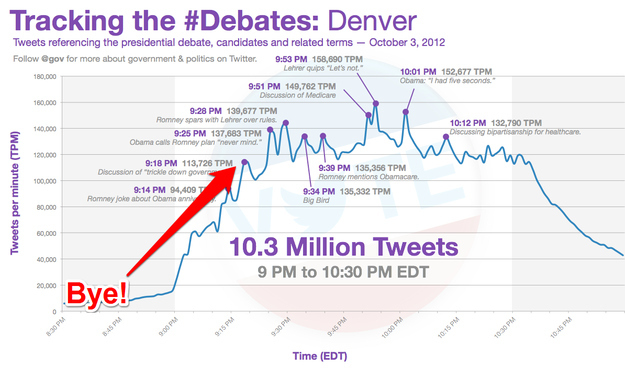Around 9:00 p.m. EST, on the evening of October 3, the mob of reporters and politicos gathered in Denver for the first presidential debate looked up, with alarm, from their laptops.
Just a few minutes had passed and the candidates had begun answering questions in earnest. Pundits and politics writers were racing to set an early narrative; reporters were live-tweeting the candidates' every utterance. Seemingly everybody else, able or not, made jokes.
In an instant, the sheer noise on Twitter had overwhelmed the signal. The stream flowed by too fast to read, much less retweet. And the service that has defined an election cycle became effectively useless.
I watched reporters around me at the University of Denver go into a sort of write-only Twitter mode, feeding the roar but covering their ears — tweets flew by on their screens too quickly for any human to read. Andrew Kaczynski, a politics reporter at BuzzFeed, told me his TweetDeck actually crashed during the deluge. It was a truly odd sensation:
GUYS!!! TWEET DUMP!!! TWEET YOUR SECRETS! TWEET YOUR DESIRES!!!! NOBODY WILL SEE THEM FOR THEM NEXT 85 MINUTES!!!
 GUYS!!! TWEET DUMP!!! TWEET YOUR SECRETS! TWEET YOUR DESIRES!!!! NOBODY WILL SEE THEM FOR THEM NEXT 85 MINUTES!!!-- John Herrman
GUYS!!! TWEET DUMP!!! TWEET YOUR SECRETS! TWEET YOUR DESIRES!!!! NOBODY WILL SEE THEM FOR THEM NEXT 85 MINUTES!!!-- John Herrman
The bar was too crowded and the music was too loud. Everybody was shouting and nobody was being heard.
This was, in a quantifiable way, a unique event. After the debate, Twitter announced it had been "the most tweeted-about event in U.S. politics," resulting in over ten million tweets over its duration (and millions more in the immediate aftermath). Looking at the data, you can see where those of us who follow a lot of politically inclined people went into info-shock:

If the Denver debates were the most tweeted political event in history, election day may be its busiest event, period. The early evening in particular, when real data starts trickling in, could send Twitter into a frenzy that won't end until the next day.
The debate Twitter blackout, as acute as it was, was isolated: Twitter's political class, and its audience, shouted itself into obscurity. It was their part of Twitter that was overwhelmed, and it has a limited ability to overwhelm the rest of the site. It was significant in that this election's most influential voices temporarily lost their most visible platform. But the noise was, in practice, still avoidable.
Election Day, however, will be all-consuming. This is something that virtually everyone on earth cares about, and that a large part of the American, and global, population will be tracking very closely (over 70 million Americans watched 2008 election day unfold on TV, for reference). The slow, somewhat unpredictable release of exit polls and eventually ballot data is exactly the kind of situation where Twitter usually mobilizes; then, however, it will be stretched beyond its practical limits. (It will also be a hazardous place, as the Associated Press warned its staff on Sunday. Twitter may be good at sussing out facts, but the process can be messy. In an election, where the outcome will simply be announced eventually, Twitter's value as a fact-vetter is questionable.)
Twitter depends on users to curate their own feeds and encourages a particular sort of curation: a follow list large and active enough to keep moving during slower periods, but small enough not to overwhelm during more active ones. Election Day will not just be an outlier, it will be the outlier, an unprecedented flood inside the site's rigid structure. (A structure which, it's worth noting, will probably survive the technical strain of Election Day, after years of hardening against actual outages.)
Twitter suggests inundated users view Twitter from one of its election-themed landing pages, or from relevant tag pages (#election, for example), which favor popular tweets over a raw reverse-chronological flow. Users could also create a special Twitter list, or manually check updates from a few key people. All of which is to say that Twitter will still be useful on election night — just not as Twitter.
But perhaps on Tuesday the millions of Americans who've spent this election online will give in to a certain kind of nostalgia for 2008; not at the polls, necessarily, but in front of the TV.
Footnote: Here's a fascinating time capsule, in Twitter's post-election-day blog post from 2008: "Updates increased 46% from previous Tuesday," wrote cofounder Biz Stone. "Messages per second peaked almost 3x compared to first debate. And through it all, not a whale in site!"
